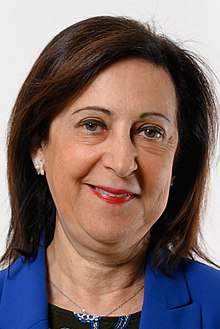| Minister of Defence | |
|---|---|
| Ministro de Defensa de España | |
 National Emblem | |
| Ministry of Defence | |
| Style | Mr./Ms. Minister (informal) The Most Excellent (formal) |
| Status | Head of a ministry |
| Abbreviation | MINISDEF |
| Member of | Council of Ministers National Security Council National Defence Council |
| Reports to | Prime Minister |
| Residence | Ministry of Defense HQ, 11th floor |
| Seat | Ministry of Defense Headquarters Madrid |
| Nominator | Prime Minister |
| Appointer | Monarch countersigned by the Prime Minister |
| Term length | No term fixed |
| Precursor | Minister of War Minister of the Navy Minister of the Air |
| Formation | 17 May 1937 |
| First holder | Indalecio Prieto as Minister of National Defence |
The minister of defence is the highest authority of Spain's Ministry of Defence, which is in charge of the preparation, development and execution of the defense policy determined by its government, as well as the management of the Military Administration.

















